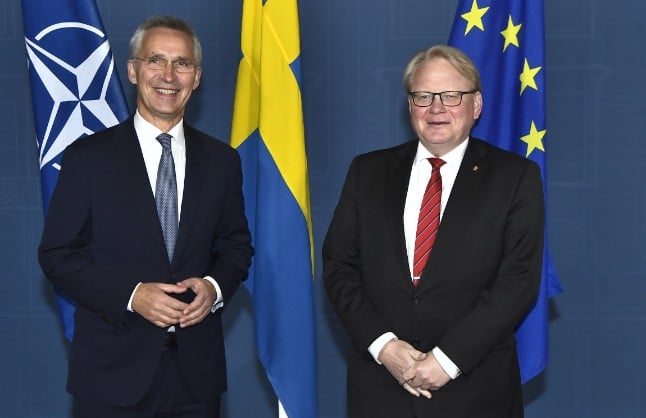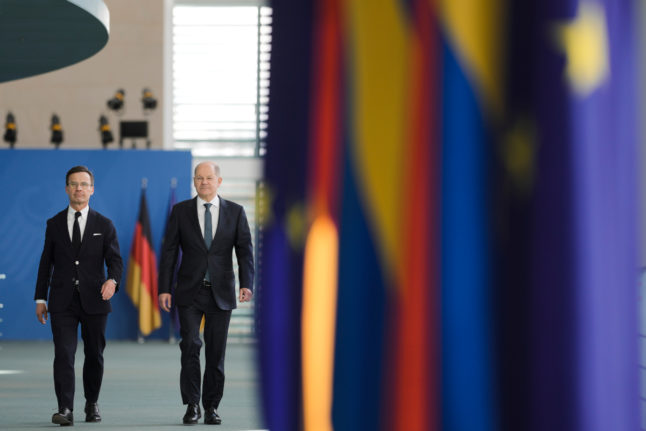What has Russia done?
On December 17th, Russia published a draft treaty with the US which included a long list of security demands, including that the US should “undertake to prevent further eastward expansion of the North Atlantic Treaty Organization”, effectively barring Sweden and Finland, the two non-aligned Baltic nations, from joining the alliance.
The draft treaty was a precursor to talks over the security situation in Ukraine between Russian President Vladimir Putin and US President Joe Biden in a 50-minute phone call on December 30th, to the bilateral meeting between the two leaders which will take place in Geneva on January 10th, and to the Nato-Russia Council meeting on January 12th.
Charly Salonius-Pasternak, leading researcher at the Finnish Institute of International Affairs, told The Local that the demand in the draft treaty marked a shift in Russian rhetoric.
“One line is to say ‘well, there’s nothing new in this. Russia has made it clear over the years that it would prefer not to see Finland and Sweden join Nato’,” he said.
“But what has not happened before is two things: one, wanting some sort of guarantees in writing from Nato, and, two, making it clear that what Russia is demanding for Ukraine and Georgia applies to Finland and Sweden too – ‘near neighbours’.”
How did Sweden react?
Sweden’s defence minister, Peter Hultqvist, said before Christmas that the Russian request was a “totally unacceptable” infringement of Sweden’s options.
“We must have the freedom to take our decisions based on what we believe is best for the Swedish people. It is about our basic sovereignty and freedom of action to make our own decisions,” he declared.
Foreign Minister Ann Linde then on Wednesday, January 5th flew to Washington for three days of talks with top US officials.
Hultqvist has faced criticism from centre-right parties, however, for adding that Sweden “will not join Nato, either now or later”.
“That is precisely what the Kremlin wants to hear,” Kerstin Lundgren, foreign policy spokesperson for the Centre Party, complained. “Hultqvist has the exact same position on Swedish Nato membership as the Kremlin. To be able to make your own decision must also include being able to actually join Nato.”
In Finland, where the so-called “Nato option” is an important pillar of security policy, both the country’s president, Sauli Niinistö, and the country’s prime minister, Sanna Marin, used their New Year addresses to assert the country’s right to choose its own alliances.
Ulf Kristersson, head of the centre-right Moderates, said on Facebook on Tuesday that Sweden’s Prime Minister Magdalena Andersson should have done the same.
“Sweden should now, in broad political agreement, do the same as Finland. It would strengthen our country’s security, and it would increase the stability of our part of Europe,” he wrote on Facebook on Tuesday evening.
On Thursday, that is exactly what Sweden’s prime minister, Magdalena Andersson, did, belatedly putting out a strongly worded statement after a call with Niinistö.
“In Sweden, it is we ourselves who get to decide over our foreign and security policy and who we choose to cooperate with,” she said in a written statement. “International rights must be respected and followed. These include every state’s right to independently set its own direction in security policy.”
Andersson was later on Thursday set to hold a second call with Nato’s Secretary-General, Jens Stoltenberg.
How likely is it that Sweden join Nato?
Public support for joining Nato has been increasing in Sweden. A Demoskop poll last year found that fully 46 percent of Swedish citizens supported joining the alliance, an increase of 10 percentage points in just two years, and up from as low as 17 percent in 2012.
Sweden’s parliament in December voted through a parliamentary decision calling for the country to, like Finland, officially hold open a “Nato option”.
This was possible because the Sweden Democrats dropped their previous ambivalence over Nato membership and sided with the pro-membership Moderate, Centre, Christian Democrat and Liberal parties.
Linde said that this parliamentary decision, and the resulting international uncertainty over whether Sweden’s position, was “not good for Swedish security”.
While defence minister Peter Hultqvist has brought Sweden’s armed forces closer to Nato, with Sweden running frequent joint military exercises, the Social Democrat party remains strongly opposed to joining.
“The Social Democratic Party is, for identity reasons, quite clear that Sweden should have an independent voice in international politics, and they have a very 1980s perspective of Nato as being US-controlled,” Magnus Christiansson at the Swedish Defence Institute, told The Local.
While the right-wing parties have united behind support for Nato membership, the centre-left and left were implacably opposed, meaning it will take a change of government, and probably a referendum, for Sweden to join.
Are Sweden and Finland likely to join or stay out of Nato together?
Russia’s annexation of Crimea and continuing aggression against Ukraine has not only pushed Sweden closer to Nato, it has also deepened Sweden’s military cooperation with Finland. Many see it as unlikely that either of the two countries would join Nato separately.
Salonius-Pasternak at the Finnish Institute of International Affairs argues that this could act as a barrier to Sweden joining, given the much lower support for Nato membership in Finland.
“Opposition to Finnish Nato membership has been between 60 percent and 70 percent since people started asking in the early 90s,” he said. “So while in Sweden it’s entirely conceivable that there would be enough support, in Finland, there just isn’t yet.”
What will Sweden want from the coming Russia-Nato summit?
The US’s National Security Advisor Jake Sullivan spoke to his counterparts from Sweden, Finland, Denmark, Iceland, and Norway, on Tuesday, and participants in the call “reaffirmed the right of each country to choose its alliances,” the White House said in a press release.
This is exactly the sort of public affirmation Sweden will be looking for next week. One thing Sweden and Finland will certainly not want the US to do is to cede any ground on their potential future membership or on Nato’s right to mount joint training exercises on their territory.
“If there was even a whiff of a sense, and I don’t actually perceive that there is now, but if there was, that the US was willing to say, ‘okay, we’re going to give up on this and put a moratorium on Nato expansion, that would seriously impact the foundation of Finland’s security goals,” Salonius-Pasternak said.
This is unlikely to happen, but Salonius-Pasternak said it might be possible to craft language that Russia’s government can sell to its domestic audience as a Nato concession on expansion.
“Do I see some language, which doesn’t actually limit the ability of Ukraine or Georgia to become members, but could be construed as such by the Russian propaganda machine? Yes. Could I see anything equivalent for Sweden or Finland? No, I think it’s quite literally off the table.”



 Please whitelist us to continue reading.
Please whitelist us to continue reading.
Member comments